
The Celastraceae are a family of 98 genera and 1,350 species of herbs, vines, shrubs and small trees, belonging to the order Celastrales. The great majority of the genera are tropical, with only Celastrus, Euonymus and Maytenus widespread in temperate climates, and Parnassia (bog-stars) found in alpine and arctic climates.
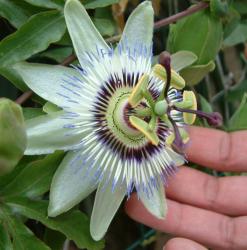
The Passifloraceae are a family of flowering plants, containing about 750 species classified in around 27 genera.

Iochroma is a genus of about 34 species of shrubs and small trees belonging to the nightshade family Solanaceae. Species are native from Mexico to south Brazil. They are found in the forests of Mexico and South America. Their hummingbird-pollinated flowers are tubular or trumpet-shaped, and may be blue, purple, red, yellow, or white, becoming pulpy berries. The cupular (cup-shaped) calyx is inflated in some species. The leaves are alternate, simple, and entire.
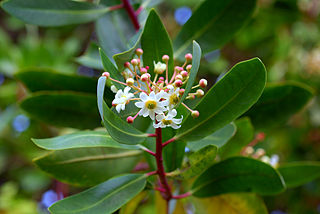
Drimys is a genus of seven species of woody evergreen flowering plants, in the family Winteraceae. The species are native to the Neotropics, ranging from southern Mexico to the southern tip of South America. They are primitive dicots, associated with the humid temperate Antarctic flora of the Southern Hemisphere, which evolved millions of years ago on the ancient supercontinent of Gondwana. Members of the family generally have aromatic bark and leaves, and some are used to extract essential oils.

Discaria is a genus of 6 species of flowering plants in the family Rhamnaceae, native to temperate regions of the Southern Hemisphere, in Australia, New Zealand and South America.

Menispermaceae is a family of flowering plants. The alkaloid tubocurarine, a neuromuscular blocker and the active ingredient in the 'tube curare' form of the dart poison curare, is derived from the South American liana Chondrodendron tomentosum. Several other South American genera belonging to the family have been used to prepare the 'pot' and 'calabash' forms of curare. The family contains 78 genera with some 440 species, which are distributed throughout low-lying tropical areas with some species present in temperate and arid regions.
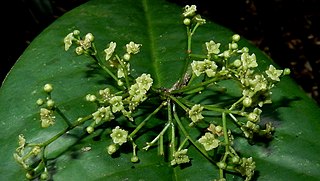
Tontelea is a genus of plants in the family Celastraceae.

John Miers, FRS FLS, knight grand cross of the Order of the Rose, was a British botanist and engineer, best known for his work on the flora of Chile and Argentina.
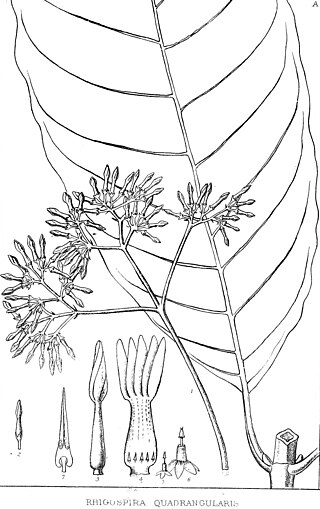
Rhigospira is a genus of flowering plants in the family Apocynaceae, first described as a genus in 1878 by John Miers. The species, Rhigospira quadrangularis was first described as Ambelania quadrangularis by Johannes Müller Argoviensis in 1860 but was transferred to the genus, Rhigospira, in 1878 by John Miers. The genus contains only one known species, Rhigospira quadrangularis, native to northwestern South America.

Witheringia is a genus of flowering plants in the family Solanaceae, with a neotropical distribution. It is closely related to Physalis.
Aptandra is a genus of flowering plants. In the APG IV system, the genus is placed in the family Olacaceae. Other sources place it in the segregate family Aptandraceae.
Brachistus is a genus of flowering plants belonging to tribe Physaleae of subfamily Solanoideae of the nightshade family,Solanaceae.
Cheiloclinium is a genus of flowering plants belonging to the family Celastraceae.

Pachygone is a genus of flowering plants belonging to the family Menispermaceae.
Hylenaea is a genus of flowering plants belonging to the family Celastraceae.
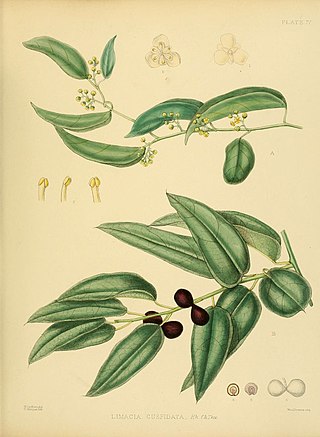
Hypserpa is a genus of flowering plants belonging to the family Menispermaceae.
Stizophyllum is a genus of flowering plants belonging to the family Bignoniaceae.
Saracha is a genus of flowering plants belonging to tribe Physaleae of subfamily Solanoideae of the nightshade family Solanaceae. The genera most closely related to Saracha are Iochroma, Dunalia and Vassobia.

Salpichroa is a genus of flowering plants belonging to the family Solanaceae.
Pycnarrhena is a genus of flowering plants belonging to the family Menispermaceae.













